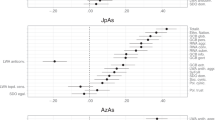Abstract
In recent years, Western countries and NATO have repeatedly intervened in international conflicts using military means (e.g., Kosovo, Macedonia, and Afghanistan). The countries involved in these military operations have stated that these interventions did not serve strategic goals; instead, their prime purpose was to enforce human rights. Against this background the present paper aims to answer two main questions: First, how can attitudes toward such military interventions be measured? Second, how are these attitudes related to prosocial and antisocial personality dispositions? Two studies were conducted to address these questions. A first study with 275 university students from Germany enabled us to develop a short and reliable scale to measure attitudes toward the military enforcement of human right. A second study (N = 190) revealed that authoritarianism and the willingness to aggressively sanction the antisocial behavior of others were positively related to this attitude, while no significant relationship with prosocial dispositions emerged. Furthermore, it could be shown that a high concern for human rights only then was connected to a positive attitude toward their military enforcement if persons indicated to handle their daily conflicts in an aggressive manner.
Similar content being viewed by others
References
Aiken, L. S., and West, S. G. (1991). Multiple Regression: Testing and Interpreting Interactions, Sage, Newbury Park, CA.
Altemeyer, B. (1996). The Authoritarian Specter, Harvard University Press, Cambridge, MA.
Altemeyer, B. (1998). The other “authoritarian personality.” In Zanna, M. P. (ed.), Advances in Experimental Social Psychology, Vol. 30, San Diego, CA: Academic Press, pp. 47-92.
Baxter, S., and Lansing, M. (1980). Women and Politics. The Invisible Majority, University of Michigan Press, Ann Arbor.
Berkowitz, L., and Daniels, L. R. (1964). Affecting the salience of the social responsibility norm: Effects of past help on the response to dependency relationships. J. Abnorm. Soc. Psychol. 68: 275-281.
Bierhoff, H. W. (2000). Skala der sozialen Verantwortung nach Berkowitz und Daniels: Entwicklung und Validierung [The Social Responsibility Scale of Berkowitz and Daniels: Development and validation]. Diagnostica 46: 18-28.
Bierhoff, H. W., and Rohmann, E. (in press). Altruistic personality in the context of the empathy–altruism hypothesis. European Journal of Personality.
Braithwate, V. (1998). The value orientations underlying liberalism–conservatism. Pers. Individ. Differ. 25: 575-589.
Clarke, D. (2003). Pro-Social and Anti-Social Behaviour, Routledge, London.
Doise, W., Spini, D., Jesuino, J. C., Ng, S. H., and Emler, N. (1994). Values and perceived conflicts in the social representations of human rights: Feasibility of a cross-national study. Swiss J. Psychol. 53: 240-251.
Feather, N. T. (1996). Reactions to penalties for an offence in relation to authoritarianism, values, perceived responsibility, perceived seriousness, and deservingness. J. Pers. Soc. Psychol. 71: 571-587.
Fetchenhauer, D., and Bierhoff, H. W. (2001). Zivile und militärische Durchsetzung der Menschenrechte [Civil and military enforcement of human rights]. In Bierhoff, H. W., and Fetchenhauer, D. (edds.), Solidarität [Solidarity], Leske & Budrich, Opladen, Germany, pp. 47-92.
Fetchenhauer, D., and Huang, X. (in press). Justice sensitivity and behavior in experimental games. Pers. Individ. Differ.
Finley, B., and Love, G. D. (1998). Gender differences in reasoning about military intervention. Psychol. Women Q. 22: 481-485.
Gilligan, C. (1982). In a Different Voice, Harvard University Press, Cambridge, MA.
Hänze, M. (2001). Ambivalence, conflict, and decision making: Attitudes and feelings in Germany toward NATO's military intervention in the Kosovo war. Eur. J. Soc. Psychol. 31: 693-706.
Kerlinger, F. N. (1984). Liberalism and Conservatism: The Nature and Structure of Social Attitudes, Erlbaum, Hillsdale, NJ.
Kohlberg, L. (1984). The Psychology of Moral Development, Harper, San Francisco.
Krahé, B. (1992). Personality and Social Psychology. Toward a Synthesis, Sage, London.
Moghaddam, F. M., Slocum, N. R., Finkel, T. M., and Harré, R. (2000). Toward a cultural theory of duties. Cult. Psychol. 6: 275-302.
Moghaddam, F. M., and Vuksanovic, V. (1990). Attitudes and behavior toward human rights across different contexts: The role of right-wing authoritarianism, political ideology, and religiosity. Int. J. Psychol. 25: 455-474.
Schmitt, M., Neumann, R., and Montada, L. (1995). Justice sensitivity. Soc. Justice Res. 8: 385-407.
Spini, D., and Doise, W. (1998). Organizing principles of involvement in human rights and their social anchoring in value priorities. Eur. J. Soc. Psychol. 28: 603-622.
Staerklé, C., Clémence, A., and Doise, W. (1998). Representation of human rights across different national contexts: The role of democratic and nondemocratic populations and governments. Eur. J. Soc. Psychol. 28: 207-226.
Author information
Authors and Affiliations
Rights and permissions
About this article
Cite this article
Fetchenhauer, D., Bierhoff, HW. Attitudes Toward a Military Enforcement of Human Rights. Social Justice Research 17, 75–92 (2004). https://doi.org/10.1023/B:SORE.0000018093.23790.0d
Issue Date:
DOI: https://doi.org/10.1023/B:SORE.0000018093.23790.0d



